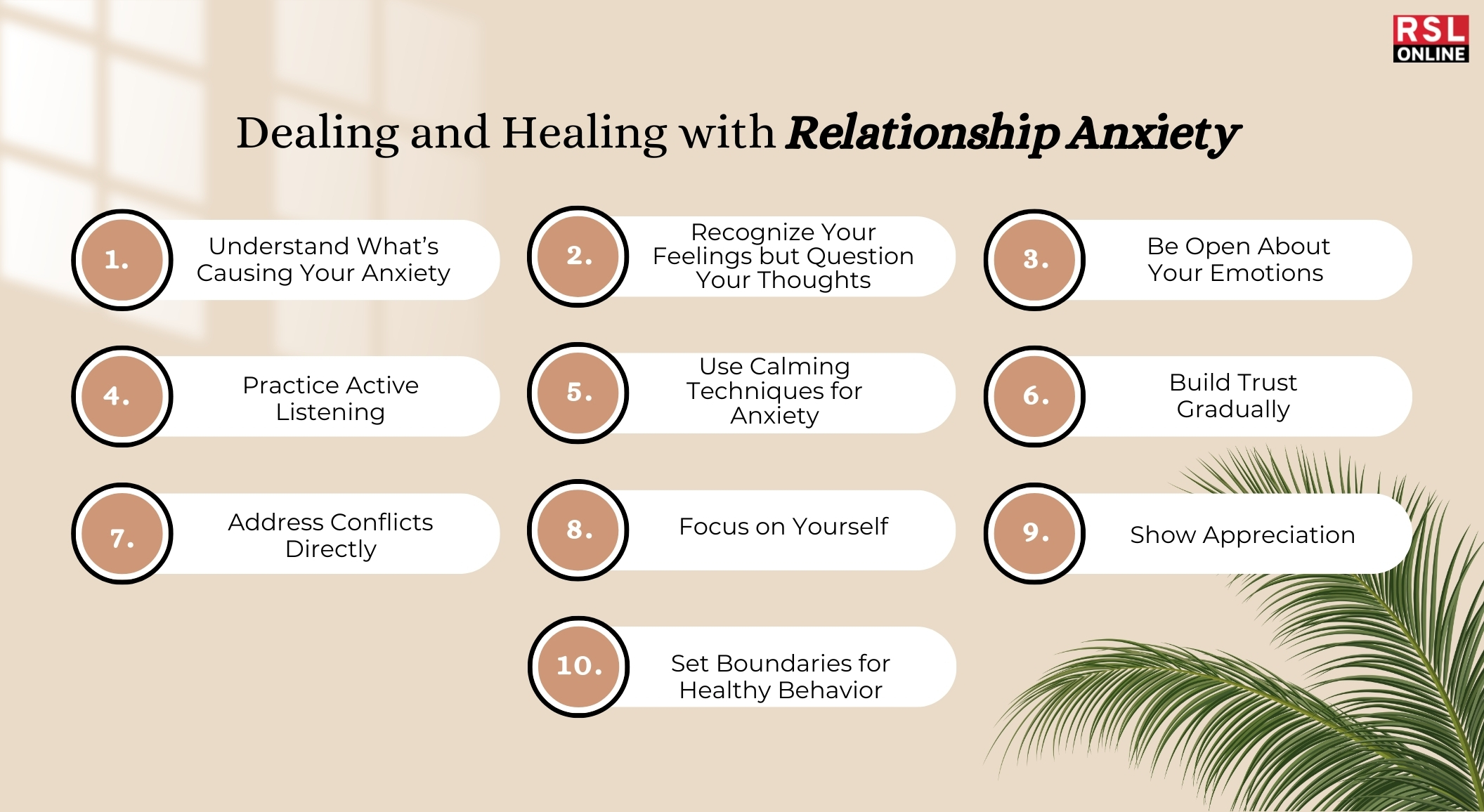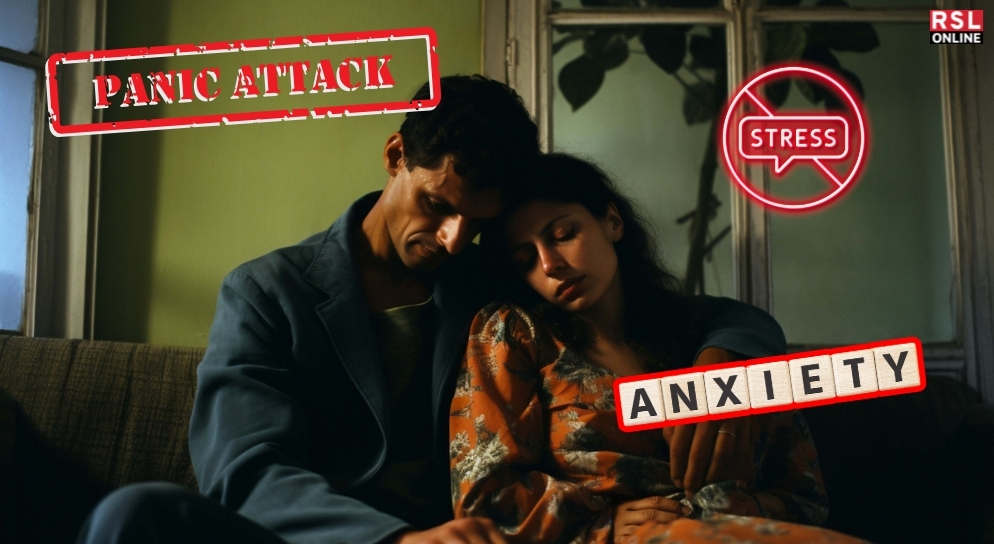Words of affirmation, physical displays of affection, and spending quality time with our loved ones are some of the ways that most of us fill our love buckets. However, there are moments when it seems like there is a hole in the bucket. If you can resonate with this situation, you might be suffering from relationship anxiety.
Few studies have been conducted on the topic, and relationship anxiety is not formally acknowledged as a disorder or a sign of a mental health issue.
However, does it not exist?
Hi. I have been in a relationship for over a decade and have been through my share of troubles. And for several reasons apart from this, I feel like I am pretty qualified to answer this question!
Henceforth, if you are dealing with the trope of “they love me, they love me not” with the smallest of fights between the two of you, it is time for you to get to the roots of it.
Keep on reading this blog till the end, and thank me later…
Understanding Relationship Anxiety

So, what is relationship anxiety?
Anxiety or insecurity that develops during a romantic relationship is what you might call relationship anxiety. It may manifest as an overwhelming need for affirmation, dread of rejection, or persistent uncertainty about your partner’s feelings.
It’s critical to understand that anyone can have relationship anxiety and that having it does not always indicate that your relationship is unhealthy. These feelings often stem from attachment issues, several past experiences, as well as your low self-esteem.
Although having occasional uncertainties is quite normal, ongoing anxiousness can negatively affect your general mental and emotional well-being and damage relationships. Fortunately, there are things you can do to manage and even get over relationship anxiety.
By increasing your self-confidence, talking honestly with your partner, and confronting your negative emotions and thoughts, you can create a more stable and secure connection.
But is it always THAT easy?
You might feel like you are doing a good job, but every time something goes wrong, thoughts come flooding, and you feel like they do not love you anymore!
Relationship Anxiety: What Does it Look Like?
Anxiety in relationships can manifest itself in several ways. Most people have some degree of relationship insecurity at some point, particularly when they are first dating and starting a committed relationship.
Since this is common, you shouldn’t be too worried by fleeting anxieties or doubts, especially if they don’t have a significant impact on you.
However, these nervous thoughts might occasionally intensify and infiltrate your day-to-day activities. Here are a few possible signs of relationship anxiety:
Do I Matter?
“Do I matter?” and “Are you there for me?” are the two underlying questions that are most frequently associated with relationship anxiety, well-known psychotherapist Astrid Robertson states.
Additionally, this speaks to a basic need to feel safe, connected, and like you belong in a partnership.
You might be concerned, for instance, that your spouse wouldn’t really miss you if you were gone and might not support or assist them in the event of a catastrophic situation. Furthermore, you might also feel like they only want to be with you because of what you can do for them.
I Doubt Whether My Partner Loves Me
You and your partner have traded innumerable “I love you’s” and “I really, truly like you’s.” They always look delighted to see you and show you kindness by going out of their way to visit you at home or bringing you lunch.
However, the persistent doubt that “they don’t really love me” might still bother you. Perhaps they react slowly to physical affection. Or they go hours or even days without responding to texts.
You wonder whether their feelings have altered when they suddenly appear a touch aloof. Everyone experiences this occasionally, but if you have relationship anxiety, these concerns may turn into a fixation.
Do they Want to Break Up?
Feelings of love, security, and happiness can be experienced in a healthy relationship. It’s normal to want to maintain these feelings and hope that nothing happens to upset them.
However, sometimes, these thoughts can turn into a persistent fear of your partner leaving you. This anxiety can become problematic when you change your behavior to ensure your partner’s continued affection.
For instance, you might:
- avoid bringing up issues that are important to you in a relationship, like being late frequently
- ignore your partner’s behavior that bothers you, like wearing shoes inside your home
- worry a lot about them getting angry at you.
Are we Compatible in the Long Term?
Even when your relationship is going well, relationship anxiety can cause you to wonder if you and your partner are really compatible.
You may also wonder if you’re truly happy or if you’re just pretending to be.
In reaction, you may begin to focus on the really small differences that you both have. For instance, they enjoy punk music, but you prefer folk-rock. Eventually, you start exaggerating how significant they are for you both to be compatible.
You are Pushing them Away
Relationship anxiety may be the source of sabotaging behaviors. Whether you are aware of it or not, the underlying objective of these actions is typically to gauge your partner’s level of concern.
For instance, you may think they truly love you if they don’t oppose your attempts to push them away. However, Robertson notes that it’s quite challenging for your partner to identify this hidden motive.
Reading Between the Lines
Another sign of relationship anxiety is a tendency to second-guess your partner’s statements and behavior.
It’s possible that they dislike holding hands. Or they insist on keeping all of their old stuff when you decide to move in together.
Yes, all of them might indicate a possible problem. However, it’s more likely that they simply adore that living room set or that their palms are sweaty.
Missing Out on the Good Times
Still not sure if you’re dealing with relationship anxiety?
Take a step back and ask yourself: “Am I spending more time worrying about this relationship than enjoying it?”
This might be the case during rough patches. But if you feel this way more often than not, you’re probably dealing with some relationship anxiety.
Where Does Relationship Anxiety Stem from?

Irrespective of whether you have just started dating or are in a committed relationship, having doubts and thoughts about whether they truly love you or not is common.
However, you may have relationship anxiety when concerns begin to permeate and become a common occurrence in a relationship.
But why does this happen? Let me tell you a few reasons why this can occur:
Negative Past Experiences
Consider a situation in which a bee stings you. Any time after that, you might experience a certain level of dread that makes you cautious about getting stung again.
Relationships can occasionally experience the same thing. If this occurs, someone who has been harmed in the past might stay tense and continuously doubt the relationship’s stability and the emotions that are involved.
An Anxious Attachment Style
The relationship you had with your parents or other caregivers as a child may occasionally be the cause of your ongoing doubts about the stability of your relationship or the intensity of your partner’s affection for you.
A child may develop a stable attachment type to their parents or guardians if they continuously offer them love and affection.
As a result of that, the child may start to cling to these cherished characters in order to get attention. Additionally, they might need to be assured of their affection all the time—qualities that could manifest in romantic relationships later on.
Individuals with anxious attachment types are usually on edge, looking for the first indications that their partners might be losing interest in them, and frequently doubt their own value. They also worry about losing their significant others as a result of this bond.
Poor Communication
Sometimes, having frank and open discussions with your partner about your feelings, the status of your relationship, or your plans together is a sign that you are worried about their affection or the future of your partnership.
Neglecting to discuss these issues might create a void in the partnership and exacerbate worry.
Low Self-Esteem
Your quality of life might be significantly impacted if you have a low opinion of your own value and worth.
A person who suffers from low self-esteem may constantly question if they are worthy of their lover’s affection or whether their partner truly feels the same way about them.
Additionally, it might promote suspicions of infidelity and other inquiries that could jeopardize the relationship’s future.
Dealing and Healing with Relationship Anxiety

Although venting to like-minded people can be cathartic, it won’t benefit you. Additionally, you might be venting to someone who shares your worries, which could cause anxiety to be transferred between you both.
Apart from this, you might want to analyze yourself a little. Think about it: What time of day is the most anxious? After an argument, is it appropriate? Or is it when your significant other is on a business trip? This is something that helped me. You can manage your anxiety by using coping mechanisms when you’ve identified the patterns.
Furthermore, one mistake that my therapist told me to avoid was to NOT take my partner as my therapist! Yes, you read that right!
But he/she is a licensed professional therapist. Yes, even if they are, you need to understand something: they don’t see you objectively.
And, because of their past interactions with you, they are susceptible to prejudices that an impartial third party wouldn’t have.
So, how can I heal and deal with this? Here are a few things that you can do to cope with relationship anxiety better:
1. Understand What’s Causing Your Anxiety
Relationship anxiety doesn’t just appear out of nowhere. It usually stems from things like fear, low self-esteem, or a lack of confidence.
Take some time to reflect on what might be at the root of your anxiety. Are there past experiences or childhood patterns that connect to your feelings today?
Once you identify the cause, you can start working on healing these parts of yourself and easing your anxiety.
2. Recognize Your Feelings But Question Your Thoughts
Relationship anxiety often brings up negative thoughts, like “They’re going to leave me” or “I’m not good enough.” While your feelings are valid, it’s important to remember that your thoughts aren’t always facts.
Try challenging these negative thoughts by asking yourself, “Is this really true?” or “Am I being overly critical?” Focus on your strengths and positive qualities to shift your mindset.
3. Be Open About Your Emotions
It can be tough to share your feelings, especially when you’re anxious. However, being honest with your partner about what you’re going through can prevent misunderstandings.
Healthy communication builds trust and brings you closer. You don’t have to face everything alone—sharing your feelings with supportive friends or family can also help.
4. Practice Active Listening
When your partner is speaking, give them your full attention. Show that you’re listening by asking questions or repeating what they’ve said to confirm your understanding.
This helps you see things from their perspective and avoid jumping to conclusions, which can ease anxiety.
5. Use Calming Techniques for Anxiety
Anxiety often comes with physical symptoms like a fast heartbeat or tightness in the chest. When this happens, practice calming exercises like deep breathing, meditation, or yoga.
Engaging in activities that ground you, like focusing on your senses, can help you feel more centered.
6. Build Trust Gradually
Trust is key to a healthy relationship, but it takes time to develop. Trust grows when both partners are honest about their feelings and keep their promises. Remember, trust is built slowly through consistent actions and openness.
7. Address Conflicts Directly
Ignoring conflicts only builds resentment. Address disagreements in a healthy way, focusing on how you feel without blaming the other person. Using “I” statements can make difficult conversations feel less confrontational.
8. Focus on Yourself
Taking care of yourself helps manage stress and, in turn, reduces relationship anxiety. Prioritize self-care, like exercise, sleep, and a healthy diet.
It’s also essential to maintain your own interests, friendships, and hobbies outside the relationship to stay grounded.
9. Show Appreciation
Instead of focusing on what isn’t working, take time to appreciate the positives. Practicing gratitude can shift your focus to what’s going well and strengthen your emotional connection with your partner.
10. Set Boundaries for Healthy Behavior
Relationship anxiety can lead to unhealthy habits like seeking constant reassurance or checking your partner’s phone.
Establish boundaries to create a balanced relationship where both partners respect each other’s space. If you find it hard to manage alone, consider seeking support from a therapist.
You Are Missing Out on Good Times!
Are you still unsure if you have relationship anxiety? Ask yourself one question: “Am I devoting more time to worrying about this relationship than to enjoying it?”
If you are going through a rough patch, this could be a very common thought! However, if this is how you feel most of the time, you’re most likely experiencing relationship anxiety.
Read More:
















![How to Rebuild Trust in a Relationship [According to Experts]](https://www.rslonline.com/wp-content/uploads/2024/12/How-to-Rebuild-Trust-in-a-Relationship-According-to-Experts-2-350x200.jpg)











![How to Rebuild Trust in a Relationship [According to Experts]](https://www.rslonline.com/wp-content/uploads/2024/12/How-to-Rebuild-Trust-in-a-Relationship-According-to-Experts-2-460x250.jpg)